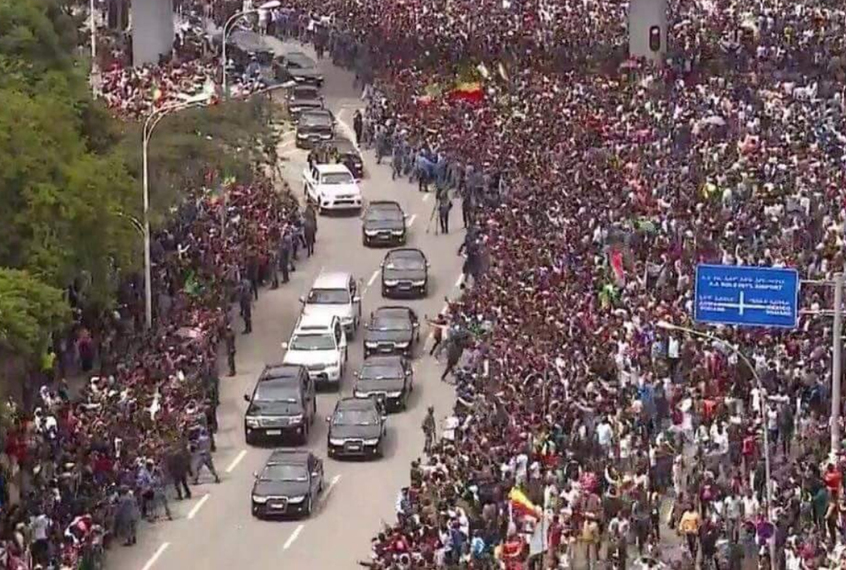Ethiopia’s landlocked geography is set to be radically improved by last week’s peace treaty with its neighbour Eritrea following a three-year-long war that ended in 2000 and caused up to 100,000 casualties.
The rapprochement, sought by the new reformist regime of Abiy Ahmed, culminated in a visit by Mr Abiy to the Eritrean capital of Asmara last weekend, which resulted in the formal end of the war and the beginning of talks to reconstruct two roads between the countries, and the development of two ports in Eritrea.
This Saturday, Isaias Afwerki, the president of Eritrea, began a three-day state visit to Ethiopia, including a visit to the flagship Hawassa Industrial Park, built by China Civil Engineering Construction Corporation in 2016.
Both leaders’ took part in euphoric street parades. In Addis, thousands of Ethiopians lined the streets singing and chanting, wearing makeup with Eritrean and Ethiopian symbols, and T-shirts with images of Isaias and Abiy.
Al Jazeera reported a mood of jubilation in the Ethiopian capital on Saturday: “People are really happy, although they cannot fully comprehend the speed that things have happened in the last month. Both countries have a lot to gain from the resumption of relations – Ethiopia more than Eritrea, as it is landlocked. Ethiopia is looking forward to using Eritrea’s ports instead of using the port of Djibouti.”
President Isaias said in his speech, given at the Millennium Hall in Addis:”We have triumphed over the toxic schemes of the past years aimed at sowing the seeds of hate, resentment and destruction. These malignant acts are indeed anathema to our cultures as well as to our historical and cohesive interests. We are now jointly embarking – with determination – on the path of development, prosperity and stability in all fields and fronts.”

Saturday’s Addis Ababa motorcade. Yemane Meskel, Eritrea’s information minister, tweeted: “It feels like the beginning of the African renaissance.” (Eritrean Ministry of Information)
The specific developments involve the reconstruction of Ethopia’s routes 1 and 2 – Eritrea’s P3 and P7 – which lead to the northern port of Massawa and the southern port of Assab.
These roads give Ethiopia a way to escape its geographical trap. At present, Ethiopia is dependent on the microstate of Djibouti, which processes about 70% of its trade with the outside world. This dependence has increased as Ethiopia’s economy has expanded from $8bn in 2000 to $80bn in 2017: the number of containers passing through the Port of Djibouti has increased from a little over 175,000 in 2002 to about 1 million at present.
Although the Djibouti bottleneck has been greatly widened in recent years, owing to the construction of a high-speed electrified railway between Djibouti and Addis Ababa and the building of the Doraleh container terminal (see further reading), the Ethiopian national economy is entirely dependent on this single route.
The first step will be the simple reopening of the roads, which were the main supply lines of the two armies when they fought their bloody World War I-style conflict between 1998 and 2000, in which Ethiopia held the upper hand.
Both countries now expect to reap a peace dividend. In Ethiopia’s case the aim is to increase the country’s holding of foreign currency, necessary for further economic growth.
For Eritrea, with its tiny, $2.6bn economy, the deal gives the prospect of greater transit fees and capital investment in its infrastructure which it would not otherwise be able to finance.
Top image: Prime Minister Abiy (left) with President Isaias (Yemane Meskel/Eritrean Ministrey of Information)
Further reading:






